Inside a struggling Ukraine mine, Trump’s mineral deal dreams meet war-torn reality
Davao aims for waste-to-energy


THE DAVAO City waste-to-energy (WTE) project is gaining momentum with the formation of a crucial Technical Working Group (TWG), a city council member revealed over the weekend.
Councilor Temujin “Tek” Ocampo, who heads the City Council’s Committee on Environment and Natural Resources, said the TWG is led by the Department of Environment and Natural Resources (DENR), in collaboration with the Davao city government and the City Environment and Natural Resources Office (CENRO).
Based on its design, the WTE plant has a capacity of 600 metric tons and the ability to generate up to 12 megawatts of energy.
Mr. Ocampo cited the potential benefits of the proposed project, which draws inspiration from the success of the TWE plant in Kitakyushu City in Japan.
It integrated stringent pollution control, waste segregation, proper disposal, and early-age education in its operation and is now a benchmark for environmentalists.
Mr. Ocampo expressed hope that more than just waste reduction, the proposed WTE could contribute to Davao City’s energy needs.
Davao City, with a population of 1.6 million, generates a daily average of 600 to 650 tons of garbage, as per data from the CENRO. The existing challenge lies in the accumulation of waste at the city’s sanitary landfill in Barangay New Carmen, Tugbok District.
Since 2016, the landfill has surpassed its full capacity, accumulating 900,000 tons against the intended 700,000 to 800,000 tons.
As Davao City grapples with the mounting waste crisis, the TWG’s formation signifies a crucial step toward the implementation of a sustainable solution.
With Kitakyushu as a guiding example, Mr. Ocampo envisions Davao City adopting effective waste management practices, fostering a cleaner environment and contributing to the city’s energy sustainability through the WTE project.
“Although, based on the data and all of the best practices that are being done in Kitakyushu, Japan there are no negative effects on human health. Japan strictly monitors the emission of toxins such as dioxin,” he said. — Maya M. Padillo











